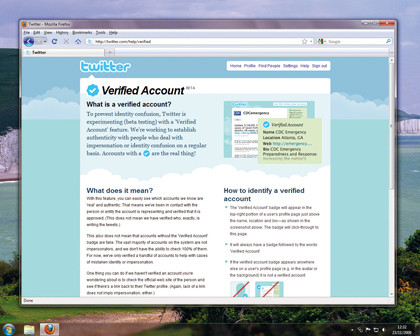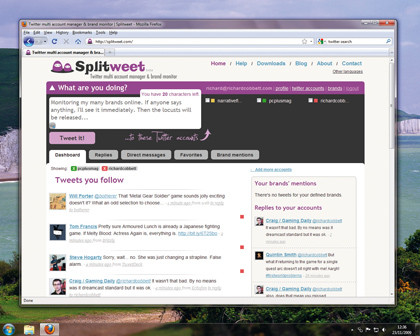Twitter isn't all self-immolation on the part of celebrities, either. With the ability of tweets to spread like wildfire – first across Twitter itself and then across news websites worldwide – a hacked account spells disaster.
"Britney has passed today," said a tweet on Britney Spears' account (@britneyspears) after it was hacked in June. Spears had more than two million followers at the time, meaning that the 'news' travelled fast. But this isn't the first – or last – time that Spears' account has been hacked.
Mid-November saw her account spammed with updates telling the world that the singer had started worshipping Satan, and back in January followers were surprised to see this message from the star: "Hi y'all! Brit Brit here, just wanted to update you all on the size of my vagina. It's about four feet wide with razor sharp teeth." Perhaps Spears and her team need to take password security a little more seriously in future.
Twitter attempts to limit the potential damage done by celebrity impersonators by using Verified accounts. "That means we've been in contact with the person or entity the account is representing and verified that it is approved," says the site.

VERIFICATION: Verified accounts were Twitter's first push towards professional services. Commercial accounts are on the way
But what about the impersonators that Twitter knows exist, yet continue to post in the celebrity's name? "Twitter's pretty poor at actually taking off fakes," says Borkowski, but the amount of damage done by hackers is usually limited. Big social-networking sites are "incredibly reasonable" when it comes to removing objectionable content, according to lawyer Iain Connor. "They need to keep their credibility [and] they need to keep their trusted brand," he says.
Verified accounts don't mean safety for the celebrity, however: they simply confirm that it was probably the star who wrote the message. Without the usual filter of PR managers, talent agents or editors to prevent the publication of anything potentially damaging, such accounts are a dream for the media. Twitter is "a newswire direct from the celebrity" that newspapers turn into stories, confirms Borkowski.
Sign up for breaking news, reviews, opinion, top tech deals, and more.
Business as usual
But even if individual stars are at risk from Twitter, corporations should be safe, shouldn't they? After all, "just about every organisation has a PR department now," according to Managing Director of Racepoint PR, Blaise Hammond.
Racepoint PR manages public relations for social media sites such as Digg, eHarmony and BlogHer. The illusion that all companies tread carefully with new services such as Twitter was shattered in June, however, when furniture retailer Habitat (@habitatuk) attempted to cash in on the site.
The store tweeted about deals it was offering, then attempted to give its tweets greater visibility by attaching unrelated hashtags (a hash symbol followed by a keyword that enables Twitter users to search for and follow a popular 'trending topic').
"#Mousavi Join the database for free to win a £1,000 gift card" read one tweet, disastrously mixing the Iranian presidential candidate with a drive to sign people to its mailing list. "#iPhone Our totally desirable Spring collection now has 20% off!" read another.
Habitat acted swiftly to remove the offending tweets, but the damage was done. The story was picked up by mainstream news organisations such as Sky and the BBC, provoking outrage that the company was abusing the hashtag system and essentially spamming users.
Habitat was quick to acknowledge its blunder and offered contrition. "We are treating this very seriously," said the company. "We were shocked when we discovered what happened and are very sorry for the offence that was caused. This is totally against our communications strategy."
Adding irrelevant hashtags to marketing tweets was "incredibly stupid", according to Hammond. "It was very easy to find out, and they got found out straight away."
He says companies need to think carefully about how they tweet. "Thoughtlessness coupled with stupidity equals big impact," he says. "Common sense is missing in so many cases." Even when a company has a specific Twitter strategy, "more often than not it's not as good as it could be because they just don't think about it enough".

TWIT-BOTS: It's not just your mates watching: automated systems search Twitter for mentions of their people or products
Gun, foot, aim, fire
While Twitter clearly poses problems for high-profile Twitterers, it can be a threat to individuals as well. Few know this better than Connor Riley (@theconnor), a student at the University of California in Berkeley who was offered a summer internship last year by networking giant Cisco.
"Cisco just offered me a job! Now I have to weigh the utility of a fatty paycheck against the daily commute to San Jose and hating the work" she tweeted to her followers. But she soon regretted it. "Who is the hiring manager? I'm sure they would love to know that you will hate the work. We here at Cisco are versed in the web" tweeted Tim Levad, a services consultant at Cisco, in response.
Before long, the story had hit MSNBC, The Los Angeles Times and hundreds of blogs worldwide. Riley now calls her misguided tweet "a stupid mistake", and says that it was the result of treating Twitter like Facebook, where only your close friends are able to see what you say.
However, Iain Connor notes that "it's perfectly legal" for companies to monitor what their employees are up to on social-networking sites. "As an employee you have a duty of good faith to your employer," he says. "That duty of good faith extends not just to your nine to five."
So what's a Twitterer to do? "Don't drink and tweet," advises Borkowski. More importantly, don't take it too seriously. Borkowski says social media refusniks are dying out. "Take it with a pinch of salt and it's fun, it's interesting, and you learn more," he recommends.
Just remember to think twice before you say anything that you wouldn't want your mother – or your employer – to read.
-------------------------------------------------------------------------------------------------------
First published in PC Plus Issue 291
Liked this? Then check out The pros and cons of Twitter marketing
Sign up for TechRadar's free Weird Week in Tech newsletter
Get the oddest tech stories of the week, plus the most popular news and reviews delivered straight to your inbox. Sign up at http://www.techradar.com/register